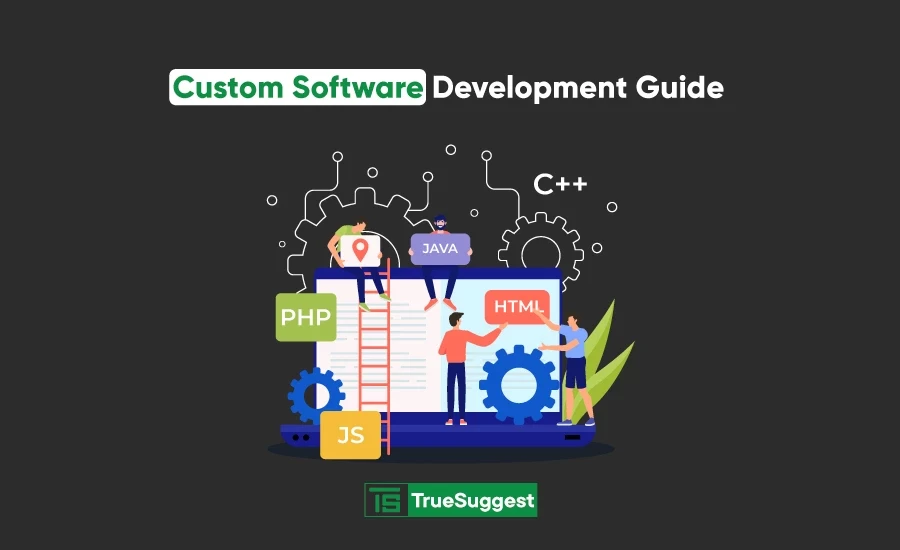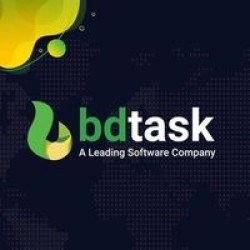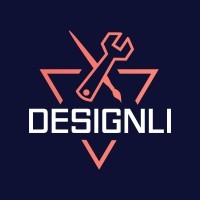Custom Software Development Services - User Guide

We live in a time where most of our tasks depend on technology. We have to rely on that. Software applications have become a part of our day-to-day lives. However, it's not easy to develop software and run it smoothly.
What's more, do we really know how software development works? Who develops software, and where can we get software development services? Throughout this blog, we will describe software development services and their work ethics.
What Is Software Development Services?
Software development contains a few crucial steps, such as designing, creating, and testing. Maintaining the software application is also a continuous process that ensures problem-solving and improved user experience.
Developers work on the DevOps method when developing software. DevOps is a combination of Development (Dev) and Operations (Ops). This method mainly represents the combined work of the developer and IT team.
This team's main job is to maintain continuous integration and delivery (CI/CD). The ultimate collaboration of these two teams can possibly provide the best solution. Not to mention that, someone may call it custom software development services.
Types of Software Development
Software development has many types, and different developers are skilled in different parts of it. Various types of developers work together to complete a project. Based on purpose, platforms, and technologies, software development is categorized into different types.
1. Web Development
Web development involves creating, building, and maintaining websites or web applications. Web applications are generally accessed via internet browsers. However, web development has three focused points: frontend, Backend, and Full-Stack Development.
# Frontend
Front-end is the visible part of a website or web application. It is also known as the client side of the application. Front-end mainly focuses on designing and building user interfaces (UI). Ensuring a smooth user experience (UX) is also its primary goal.
The front-end development technologies and languages are HTML, CSS, and JavaScript. Popular frameworks for front-end operation include React.js, AngularJS, Vue.js, etc. A front-end developer's primary responsibility is to ensure consistent performance across all major web browsers.
# Backend
Backend development is the core of building a website or web application. It's the server side of a website. In addition, the backend controls the frontend, which is combined with databases, servers, and APIs. Backend ensures that everything happening in the frontend runs smoothly.
Users never see what is happening at the backend, as it's only visible to developers. Most developers build the application using JavaScript, Python, PHP, Ruby, and C# languages. Frameworks such as Express.js, Flask, and Spring Boot simplify the development process.
# Full-Stack Development
Full-stack development represents the practice of working with both frontend and backend development. Full-stack developers are generally skilled in every field of development. From designing user interfaces to managing servers and databases, they have it all at their fingertips. They’re capable of maintaining logic, databases, and servers along with programming languages.
2. Custom Software Development Services
When an organization or institution develops software based on their needs and requirements, it is called custom software. Custom software isn't for everyone; hence, it's expensive and time-consuming. Therefore, it's not an easy process as well. It’s also known as bespoke software development services.
To build custom software, the developer has to make the design according to the client's needs. But the question is, developing custom software that simple? Well, I would say it definitely contains some risk. If there were no risk, everyone would go for custom software rather than off-the-shelf software.
However, off-the-shelf software can be purchased at a lower cost or on a subscription basis. At the same time, developing custom software can cost hundreds to thousands of dollars or even more. An organization can easily meet all its requirements by creating custom software if it can afford its risks and costs. Along with mentioned programming and languages, many developers use ColdFusion Framework to develop the software.
3. Mobile App Development
Mobile app development is the process of developing software applications for mobile devices like smartphones and tablets. Mobile app development generally targets two major operating systems, Android and iOS. There are four types of mobile applications. Which are—
- Native Apps
- Web Apps
- Hybrid Apps
- Progressive Web Apps (PWAs)
Creating a mobile application requires a few initial steps, such as planning, designing, development, and testing. Passing the testing phase indicates that the app is ready to deploy in the app store and marketplace. Moreover, iOS app development is only based on Swift, while Android uses Java, Dart, etc.
4. Game Development
Developing games is a complex process where designing, building, and testing every step is crucial. It's a combined package of programming, art, storytelling, and audio. Together, these elements provide gamers with an immersive and collective experience.
Game development is more than just programming or coding. Design and storytelling have a huge impact here to attract gamers. A game developer can be a designer or an artist. Game development involves designing the software, mechanics, and assets.
The ultimate result of these elements is making a video game. What's more, video games have formats like 2D video games and realistic 3D games for a better experience. Nowadays, 3D games are more popular with gamers because of detailed visibility and graphics.
Furthermore, game development has a few types: mobile games, pc and console games, browser-based games, VR and AR games, etc. A lot of developers prefer game engines to develop games. Beginner friendliness is one of the reasons to choose them. Some of the popular game engine's names mentioned below—
- Unity Game Engine
- Unreal Engine
- Godot
- CryEngine
- GameMaker Studio
5. Enterprise Software Development
Enterprise software solutions focus on large organizations and companies rather than individual uses. These types of software are mainly used for efficient operations and to enhance organizational productivity. Enterprise software is designed to handle complex operations such as customer management, supply chain, logistics resource planning, etc.
The most commonly used enterprise software are inventory software, account planning software, HR case management software, and HRIS systems. These software are the savior for any organization to make marketing, data entry, HR, and payroll easiest.
However, developing this type of software is cost-effective because of its broad functionalities. At the same time, they can fulfill nearly every strategic need of an organization. Developers have to work carefully as this software requires integration options to get everything in one place.
Why is Software Development Important?
Software applications have become an integral part of the modern world. No one can deny its usefulness and importance. For that reason, software development should be prioritized to build a better world. Software development evolved from simple mobile apps to complex enterprise systems.
Don’t you want to know how this software thing made our life easy? In the past, companies or businesses had to maintain their stock and inventory manually. It involves taking notes with the help of pen and paper. There’s always a chance of error while writing data. Inventory software made this easy with automated systems. It reduces the possibility of errors significantly.
If we look at ways of communication, we see that it has transformed into something different. Now, we can maintain communication through social media. At the same time, video calls and messaging are a blessing. All these things were possible by computer programs.
Software development is also essential for the world economy. It creates a lot of job fields for skilled people. According to ADP Research, in the US market, most of the software developers choose to work in professional and business services. Which is around 51.1%, while the rest of the developers work in other sectors combinedly.
How to Choose the Right Software Development Partner?
Choosing the right software development company for your organization is a challenging task. It's a crucial step to ensure that the project will shine in the right way. Partner selection has a direct impact on business/project. Let’s talk about partner choosing procedure—
First, we have to know our project goals and fix our budget. We need to define which kind of software solution we’re looking for. Whether it's a mobile application or an enterprise solution. This helps organizations set their budget based on the selection type.
Additionally, thorough research on the company’s reputation and looking at client reviews can provide a broad idea. Track records are the best asset before working with someone. Learning your project partner's technical capabilities and limitations makes the path smooth.
Moreover, anyone can go for offshore software development services if they find it reliable. Working with offshore developers can save a good amount of money compared to local services. However, the time zone difference is an obstacle here. Yet, a lot of organizations take service from offshore locations.
Following these steps, you can easily choose your potential software development partner.
FAQs
1. Which is the best custom software development service company?
Ans: Selecting the best software company depends on specific requirements such as industry, budget, and desired technologies. However, you will find several renowned companies which are trusted and qualityful to their clients. Bdtask is one of the best. You can also consider Simform, Yalantis, Fingent, etc.
2. What are the services of software companies?
Ans: We discussed a few software development types above. Besides, a software company can provide software maintenance and support, cloud computing services, API development and integration, etc.































